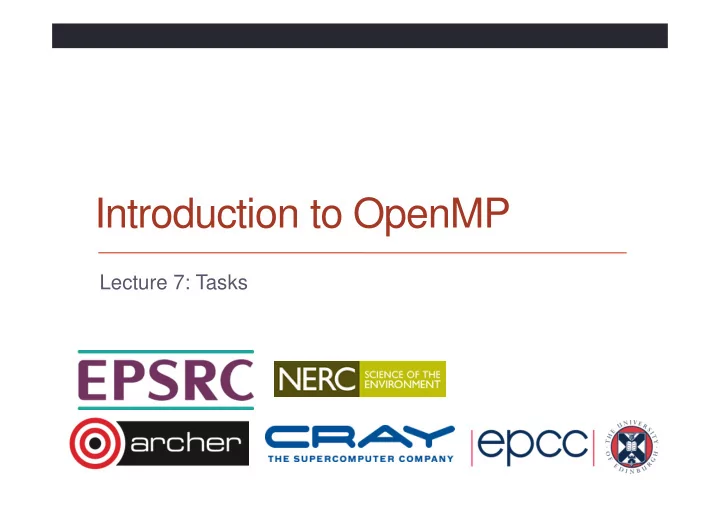

Introduction to OpenMP Lecture 7: Tasks
OpenMP tasks • The task construct defines a section of code • Inside a parallel region, a thread encountering a task construct will package up the task for execution • Some thread in the parallel region will execute the task at some point in the future
task directive Syntax : Fortran: !$OMP TASK [clauses] structured block !$OMP END TASK C/C++: #pragma omp task [clauses] structured-block
Data Sharing The default for tasks is usually firstprivate, because the task may not be • executed until later (and variables may have gone out of scope). Variables that are shared in all constructs starting from the innermost • enclosing parallel construct are shared. #pragma omp parallel shared(A) private(B) A is shared { B is firstprivate ... #pragma omp task C is private { int C; compute(A, B, C); } }
When/where are tasks complete? • At thread barriers (explicit or implicit) • applies to all tasks generated in the current parallel region up to the barrier • At taskwait directive • i.e. Wait until all tasks defined in the current task have completed. • Fortran: !$OMP TASKWAIT • C/C++: #pragma omp taskwait • Note: applies only to tasks generated in the current task, not to “descendants”
Example p = listhead ; while (p) { process (p); p=next(p) ; } • Classic linked list traversal • Do some work on each item in the list • Assume that items can be processed independently • Cannot use an OpenMP loop directive
Parallel pointer chasing Only one thread packages tasks #pragma omp parallel { #pragma omp single private(p) { p = listhead ; while (p) { #pragma omp task process (p); p=next (p) ; } } p is firstprivate by default inside this } task
Parallel pointer chasing on multiple lists All threads package #pragma omp parallel tasks { #pragma omp for private(p) for ( int i =0; i <numlists ; i++) { p = listheads [ i ] ; while (p ) { #pragma omp task process (p); p=next (p ) ; } } }
Example: postorder tree traversal • Binary tree of tasks • Traversed using a recursive function • A task cannot complete until all tasks below it in the tree are complete void postorder(node *p) { if (p->left) #pragma omp task postorder(p->left); if (p->right) #pragma omp task postorder(p->right); #pragma omp taskwait Parent task suspended until process(p->data); children tasks complete }
Task switching • Certain constructs have task scheduling points at defined locations within them • When a thread encounters a task scheduling point, it is allowed to suspend the current task and execute another (called task switching ) • It can then return to the original task and resume
Task switching #pragma omp single { for (i=0; i<ONEZILLION; i++) #pragma omp task process(item[i]); } • Risk of generating too many tasks • Generating task will have to suspend for a while • With task switching, the executing thread can: • execute an already generated task (draining the “ task pool ”) • execute the encountered task
Using tasks • Getting the data attribute scoping right can be quite tricky • default scoping rules different from other constructs • as ever, using default(none) is a good idea • Don’t use tasks for things already well supported by OpenMP • e.g. standard do/for loops • the overhead of using tasks is greater • Don’t expect miracles from the runtime • best results usually obtained where the user controls the number and granularity of tasks
Exercise • Mandelbrot example using tasks.
Recommend
More recommend